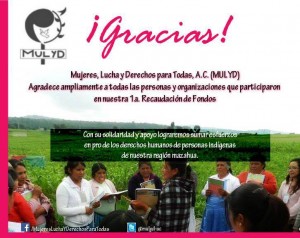Kalamazoo College has announced the ten finalists for its 2015 Global Prize for Transformative Social Justice Leadership, a juried competition hosted by the College’s Arcus Center for Social Justice Leadership. Finalists will present during a Prize Weekend, Oct. 9-11, and one project will receive a $25,000 prize. Below is one in a series of profiles on the ten finalists.
We invite individuals who are familiar with this project to use our Community Input form to comment on its “grassrootedness” and transformative leadership practices. Input will be submitted to our jurors. Please see videos submitted by each finalist, as well as our rubric and other information about the Global Prize here.
 Mujeres Lucha y Derechos Para Todas A.C. (MULYD)
Mujeres Lucha y Derechos Para Todas A.C. (MULYD)
The statistics are chilling.
In Mexico, six women die every day due to gender-based violence. Two out of three women there have suffered some form of violence. A woman is raped every 4.6 minutes. This in an a nation where only 25 percent of homes are headed by women.
Mujeres Lucha y Derechos Para Todas A.C. (MULYD), “Women, Struggle, and Rights for Everyone,” is the first organized group led by indigenous women in the Mexican state of Mexico, located in the south-central region of the country, focused mainly on working with the indigenous Mazahua women of that region.
Overall, there is a disproportionate level of violence against indigenous women than women overall in Mexico, MULYD says, while at the same time there is a lack of educational programming and support groups or frameworks for those women to turn to for help.
The group’s mission is to contribute to the knowledge and acknowledgement of women’s human rights by developing community leaders who promote and spread effective and appropriate information, particularly on sexual and reproductive rights to other women so that they may fully exercise their rights. The group is looking to grow the movement by educating and creating leaders to strengthen and perpetuate the movement, leaders say.
Currently, MULYD has organized 26 community alliances in five cities in the state, a figure they are looking to double in two years. The organization is also affiliated with the National Council of Indigenous Women and Human Rights Defenders Network of Mexico, more nationally organized human rights groups, to lobby for policy changes at the federal level.
Says Graciela Cristobal Pacheco, a Mazahua woman and participant in the group, “I believe that together we can teach [in] more places, do more things. And like other organizations reach out to other communities and other women to strengthen the organization in this region.”
